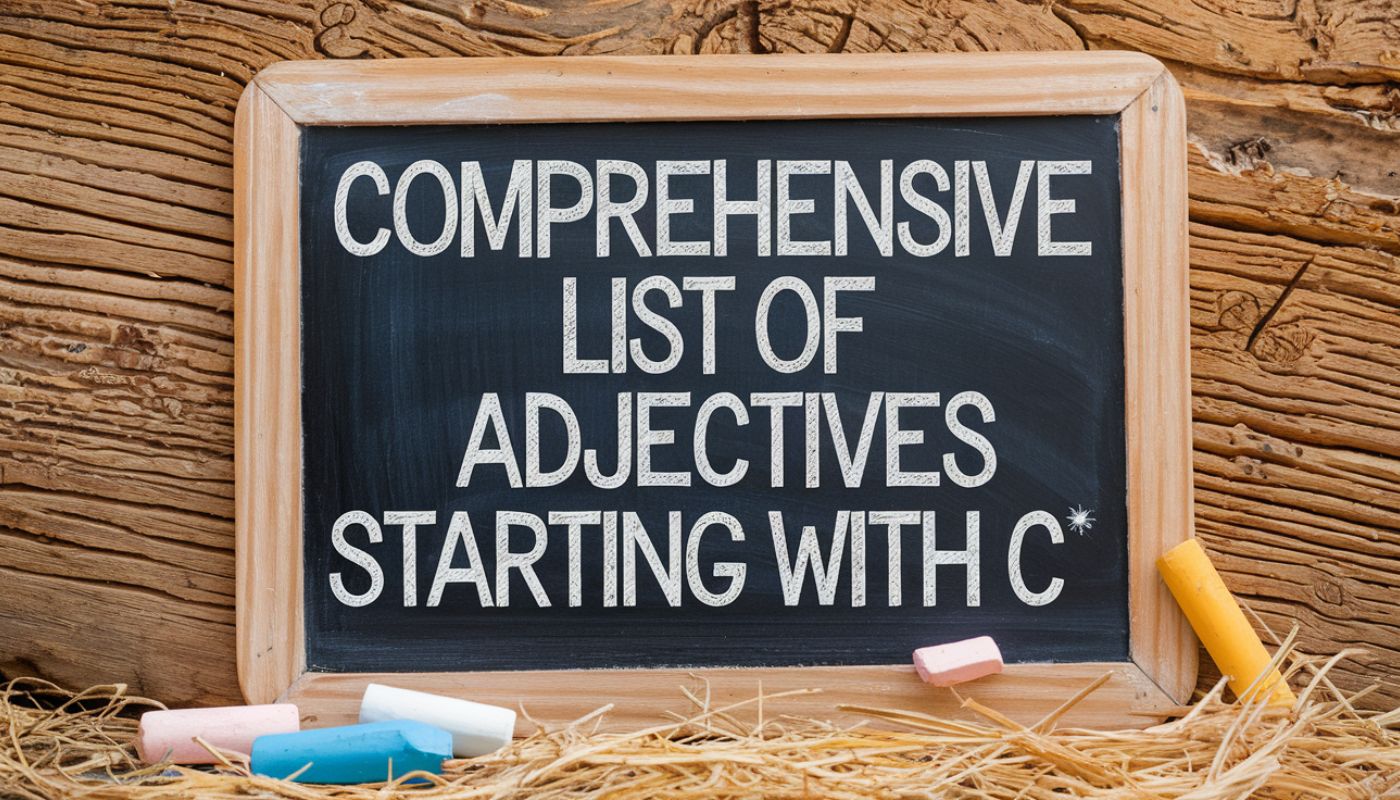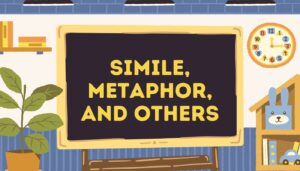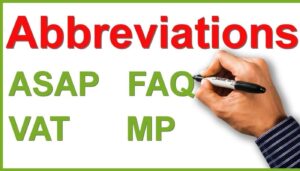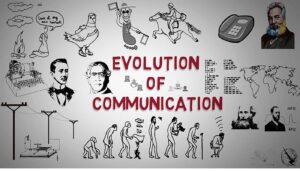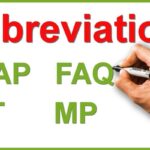Have you ever struggled to find the right words when you’re trying to describe someone or something? It’s a common issue we all face, whether in writing or everyday conversations. Enriching your vocabulary with diverse adjectives is a powerful way to communicate more effectively and with more color. Adjectives help us convey precise meanings, evoke emotions, and paint vivid pictures with words.
One great way to enhance your descriptive abilities is by focusing on adjectives that begin with specific letters. Today, we’ll delve into 25 adjectives that start with the letter “C” and explore how they can elevate your language. From the expressive to the practical, these words are versatile and perfect for spicing up your communication.
Why the Letter “C”?
The letter “C” is one of the most common letters in the English language. It’s used to describe a wide range of traits, feelings, and qualities, making it a rich source for descriptive words. Whether you’re writing an essay, creating a character for a story, or simply looking to improve your everyday conversation, mastering a few adjectives starting with “C” can help you communicate more clearly and creatively.
Common Adjectives Starting with C
Describing Appearance
When it comes to describing someone’s looks or the physical characteristics of something, adjectives are essential. Here are some “C” adjectives that can make your descriptions more vivid and accurate:
- Charming – Pleasing or delightful in manner or appearance.
- Chiseled – Well-defined, often referring to sharp, sculpted features, especially in faces.
- Curvy – Having rounded and smooth contours; typically used to describe a body shape.
- Compact – Neatly arranged or small in size, yet efficient and strong.
- Clean-cut – Neat, tidy, and well-groomed in appearance.
Describing Personality
Adjectives that describe personality traits can help others understand someone’s character or behavior in a more insightful way. Here are some “C” words that paint a clearer picture of a person’s inner qualities:
- Caring – Showing kindness and concern for others.
- Charming – Captivating, delightful, and able to attract admiration.
- Confident – Having self-assurance and a positive outlook on one’s abilities.
- Creative – Innovative and capable of thinking outside the box.
- Courageous – Brave and willing to face fears or challenges head-on.
Describing Emotions and Feelings
Feelings are complex, but the right adjectives can help communicate the nuances of emotions. These “C” adjectives can help convey deep emotional states:
- Content – Satisfied and at ease with one’s situation.
- Cheerful – In a good mood; full of happiness or optimism.
- Composed – Calm, self-controlled, and unruffled, especially in stressful situations.
- Crushed – Feeling deeply disappointed or emotionally overwhelmed.
- Confused – Lacking clarity or understanding, often because of uncertainty.
Describing Conditions or States
There are also “C” adjectives that describe the state or condition of objects, places, or situations. These can be useful for painting vivid pictures in your writing or communication:
- Cracked – Having visible splits or fractures, often used for objects like glass or walls.
- Cold – Having a low temperature; can also describe a lack of warmth in relationships or environments.
- Crowded – Overfilled with people or things, creating a sense of congestion.
- Cluttered – Disorganized or filled with too many items, leading to a sense of disorder.
- Chilly – Slightly cold; can also refer to a cool, unwelcoming atmosphere.
Describing Quality or Nature
Adjectives that describe the inherent qualities of objects, events, or situations are invaluable when trying to explain complex ideas or settings. These “C” adjectives can help:
- Classy – Elegant and sophisticated, often used for fashion or refined tastes.
- Curious – Eager to learn or explore; often used to describe an inquisitive nature.
- Crisp – Fresh, clean, and often sharp in texture or sound.
- Costly – Expensive or of high monetary value.
- Clear – Easily understood, transparent, or free from obstruction.
Why Use More Adjectives?
You might wonder: Why is it important to use a variety of adjectives, particularly ones that start with specific letters like “C”? Adjectives help us create mental images, set moods, and convey more accurate meanings.
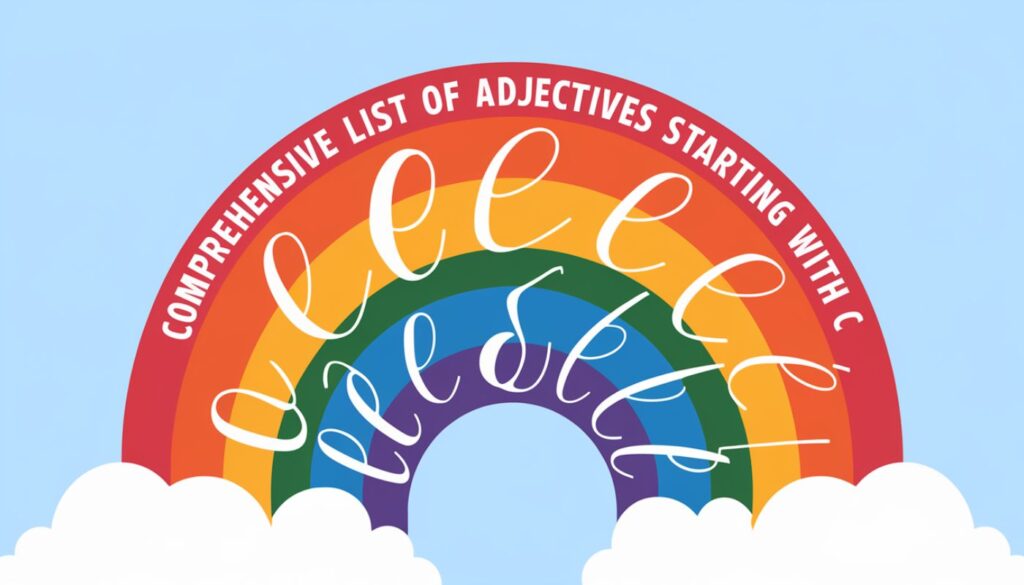
Using a wide range of adjectives not only improves clarity but also makes your language more engaging. Here’s how mastering these “C” adjectives can improve your communication:
- Enhance Clarity – The more precise your adjectives, the clearer your message.
- Engage Your Audience – Vivid descriptions make your stories, emails, and conversations more engaging.
- Boost Creativity – A rich vocabulary encourages creative expression, whether in writing or conversation.
For example, when you describe a scene using only the adjective “beautiful,” your description might feel flat. But if you say “charming, tranquil, and vibrant,” the image becomes much richer and more detailed.
How to Incorporate These Adjectives
The best way to make these adjectives a part of your regular vocabulary is by practicing them in context. Here are a few tips on how to incorporate them into your communication:
- Use them in daily conversations: Try describing people, places, or experiences using “C” adjectives. It’ll feel natural over time.
- Enhance your writing: If you’re writing a story, essay, or even a text message, replace common adjectives with more specific ones that paint a clearer picture.
- Practice creative exercises: Write short descriptions using as many “C” adjectives as possible, challenging yourself to capture both appearance and personality traits.
Describing Appearance
Our first set of adjectives focuses on physical traits and visual characteristics. Whether you’re describing someone’s look or the appearance of an object, these “C” adjectives will help make your descriptions more detailed.
- Chiseled – Having well-defined, sharp features, often used to describe faces.
- Clean-cut – Neat and well-groomed, usually referring to one’s appearance or style.
- Curly – Having hair or a texture that forms curls or loops.
- Chunky – Thick and heavy in a way that’s noticeable.
- Comely – Attractive or pleasant in appearance.
- Clumsy – Awkward or lacking grace in movement.
- Colossal – Extremely large in size, often used for objects or structures.
- Charming – Pleasing and delightful, especially in manner or appearance.
- Cold – Lacking warmth, whether in temperature or in a figurative sense.
- Crimson – A deep red color, often used for describing things like clothing or landscapes.
Describing Personality
Adjectives related to personality help us describe the qualities and behavior of individuals. These “C” adjectives can help capture the essence of a person’s character.
- Caring – Kind and considerate toward others.
- Confident – Self-assured, showing trust in one’s abilities.
- Courageous – Brave, willing to take risks despite fear.
- Charming – Easily attracting and engaging others through likable behavior.
- Cynical – Distrusting others, often with a pessimistic attitude.
- Compliant – Willing to follow the rules or instructions.
- Compassionate – Showing empathy and concern for others.
- Curious – Eager to learn or explore new things.
- Clever – Quick-witted, able to think and act in an intelligent way.
- Critical – Inclined to find fault or judge others harshly.
Describing Emotions and Feelings
Adjectives related to emotions describe the inner workings of the heart and mind. These “C” adjectives are perfect for expressing a wide variety of emotional states.
- Crushed – Overwhelmed with sadness or disappointment.
- Cheerful – Happy and optimistic.
- Composed – Calm and self-controlled, especially in difficult situations.
- Confused – Unclear in thought or unsure about a situation.
- Contemplative – Deep in thought, often reflecting or pondering.
- Concerned – Showing worry or anxiety about something.
- Content – Satisfied and at peace with the present situation.
- Cranky – Irritable or in a bad mood.
- Chilled – Relaxed, calm, or laid-back.
- Conflicted – Torn between two or more emotions or decisions.
Describing Objects, Places, or Conditions
This section is dedicated to adjectives that describe objects, surroundings, or various states of being. These words will help make your writing or speech more vibrant and precise.
- Cracked – Having visible breaks or fractures, like a cracked phone screen.
- Chilly – Slightly cold, often used to describe a cool temperature.
- Cluttered – Messy and filled with disorganization.
- Cumbersome – Heavy, awkward to carry or move, or inefficient.
- Compact – Small and efficient in design.
- Crisp – Fresh, clean, or sharp in texture or taste.
- Crowded – Full of people or objects in close proximity.
- Cold – Lacking warmth, often referring to temperature or an unwelcoming atmosphere.
- Clean – Free from dirt, marks, or stains.
- Clammy – Uncomfortably moist or damp, often used to describe skin or air.
Describing Quality or Nature
These adjectives are excellent for explaining the inherent qualities or essence of things, people, or experiences. Whether describing a situation or a product, these “C” adjectives add richness to your expression.
- Classy – Elegant, sophisticated, and stylish.
- Curious – Eager to explore or investigate.
- Costly – Expensive or high in value.
- Clear – Transparent or easy to understand.
- Creative – Original, inventive, and capable of thinking outside the box.
- Cold-blooded – Lacking empathy or compassion, especially in terms of cruelty.
- Crisp – Firm, fresh, or sharp, often used to describe foods or air.
- Cosmic – Relating to the universe; vast and expansive.
- Constant – Unchanging and stable, without interruption.
- Chaotic – Full of confusion and disorder.
Describing Action or Behavior
This section features adjectives that describe how someone behaves, reacts, or performs actions. These are helpful when you want to convey the dynamics of action and interaction.
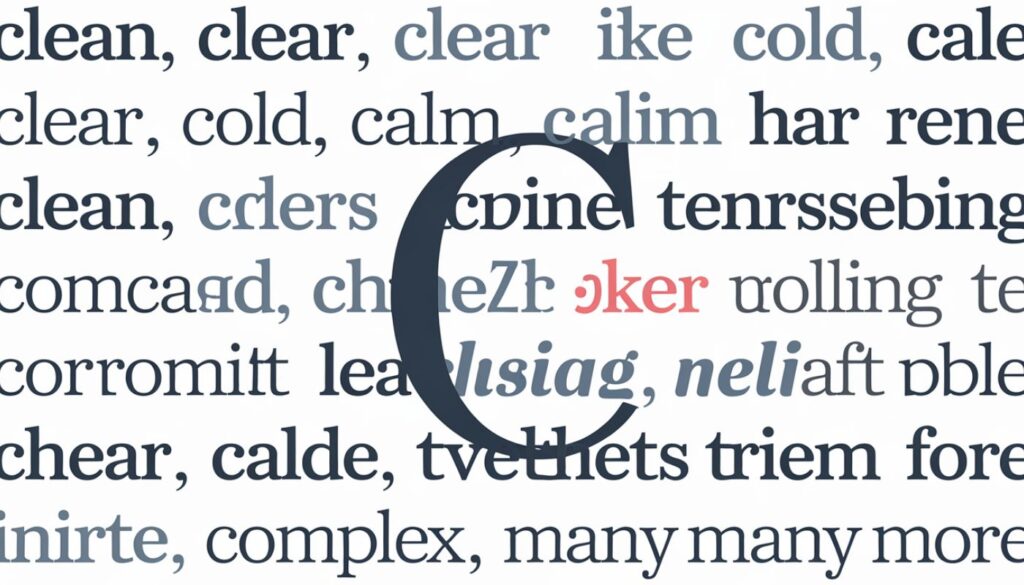
- Carefree – Untroubled by worries or responsibilities.
- Calculated – Done with careful thought and planning.
- Chaotic – Marked by disorder or confusion.
- Commanding – Showing authority or control.
- Capable – Competent and able to achieve goals.
- Confounding – Causing confusion or bewilderment.
- Cautious – Careful, avoiding risks or harm.
- Climbing – Rising or moving upwards, often used in a figurative sense.
- Chasing – Actively pursuing something or someone.
- Consistent – Reliable and steady in behavior or performance.
Describing Time or Age
Time and age-related adjectives are particularly useful in historical contexts or when describing people’s life stages. These “C” adjectives offer nuances that convey more than just chronological age.
- Contemporary – Belonging to the same period of time, modern.
- Cyclic – Happening in cycles or repeating intervals.
- Centennial – Pertaining to a 100-year period.
- Crumbling – Breaking down or deteriorating due to age or neglect.
- Current – Existing or happening now.
- Chronological – Arranged in the order of time.
- Childish – Immature or characteristic of a child.
- Creeping – Slowly progressing, often used for gradual change.
- Cultural – Relating to the ideas, customs, or social behaviors of a particular society or group.
- Classic – Timeless, traditional, and of enduring quality.
Describing Sounds or Communication
Adjectives related to sounds and communication help convey auditory qualities and modes of interaction. These “C” adjectives can enrich your ability to describe what’s heard or said.
- Clanging – A loud, metallic sound, often associated with bells or metal objects.
- Clipping – Short and abrupt in tone or speech.
- Crisp – Clear and sharp, often used to describe sounds that are distinct.
- Chirping – A high-pitched, repetitive sound, like birds or insects.
- Croaky – A hoarse or gravelly sound, often used for voices.
- Cacophonous – Harsh, discordant noise that is jarring to the ear.
- Clear – Easily heard or understood, without interference.
- Chiming – The sound of bells or a rhythmic noise.
- Calm – Low, smooth, and relaxing in sound or tone.
- Composed – Calm and controlled, often used to describe someone’s manner of speaking.
Describing Appearance
Appearance-related adjectives are perfect for providing a detailed picture of someone or something. These 25 new adjectives will help you paint even clearer images.
- Chiseled – Having well-defined, sharp features, especially in the face.
- Chubby – Round and full, often used to describe someone who has a bit more weight, typically in a cute or affectionate way.
- Creepy – Strange or unsettling, evoking a sense of discomfort.
- Cobalt – A deep blue color, often used to describe certain shades in nature or art.
- Curled – Having a spiral shape or form, often used to describe hair or tendrils.
- Cool – Trendy, effortlessly stylish, or calm in demeanor.
- Charming – Pleasant, delightful, and attractive in an engaging way.
- Crispy – Firm and brittle in texture, often used for food like fried items.
- Chiseled – Having strong, well-defined, and attractive features.
- Compact – Small but efficiently designed and neat in structure.
Describing Personality
When you want to describe someone’s character or behavior, personality adjectives play a crucial role. These adjectives starting with “C” will add more depth to your character descriptions.
- Courageous – Brave and willing to face difficulties or danger.
- Comedic – Having a humorous or funny nature.
- Cold-hearted – Lacking empathy or compassion.
- Cautious – Careful to avoid risks or mistakes.
- Cultured – Refined in manners, taste, or behavior, often due to education or experience.
- Conscientious – Guided by a sense of duty and attention to detail.
- Creative – Imaginative and able to produce new and original ideas.
- Cynical – Distrusting or believing the worst in people or situations.
- Chivalrous – Courteous and honorable, especially toward women.
- Carefree – Untroubled and without worries.
Describing Emotions and Feelings
Describing emotions accurately is essential for communication. These “C” adjectives can help express complex emotional states in a more precise manner.
- Crushed – Overcome with extreme disappointment or sadness.
- Conflicted – Torn between two opposing emotions or decisions.
- Confident – Having a strong belief in one’s abilities or judgment.
- Compassionate – Showing deep sympathy and concern for others.
- Comforted – Feeling soothed or reassured, especially during difficult times.
- Cordial – Warm and friendly, often used to describe interactions or gestures.
- Cranky – Irritable or grouchy, often due to fatigue or frustration.
- Curious – Eager to learn or explore, with an open-minded approach.
- Concerned – Feeling worried or anxious about something or someone.
- Cheerful – In a happy, positive mood, and often showing it outwardly.
Describing Objects, Places, or Conditions
These adjectives are ideal for describing the qualities of objects, locations, or circumstances. They allow you to convey more vivid and accurate depictions of the world around you.
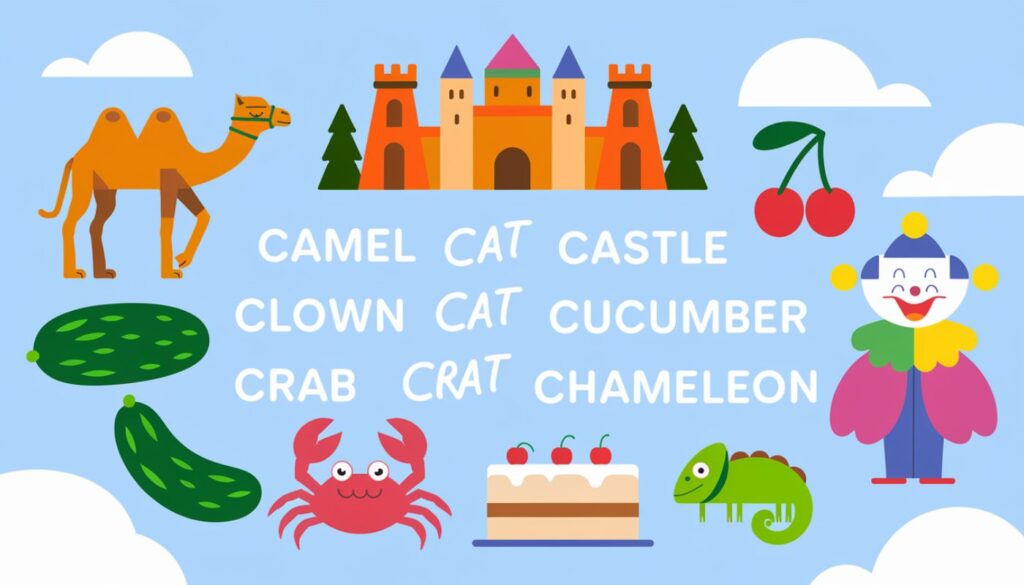
- Creaky – Making a harsh or squeaky sound, often used to describe old doors or furniture.
- Crumbled – Broken into small pieces or fragments, often used for food or buildings.
- Cavernous – Large, expansive, and often echoing, like a cave or large hall.
- Cluttered – Messy and filled with disorganized items or objects.
- Compact – Neat and small, usually referring to an efficient or space-saving design.
- Clean – Free from dirt, marks, or imperfections.
- Cloudy – Covered or obscured by clouds, often used for weather or the quality of liquids.
- Cylindrical – Having the shape of a cylinder, often used for objects like pipes or containers.
- Cold – Having a low temperature, or an unwelcoming and unfriendly atmosphere.
- Crisp – Firm, dry, or crunchy, typically used for food like fresh vegetables or baked goods.
Describing Quality or Nature
These adjectives provide insight into the intrinsic quality or nature of an object, situation, or experience, allowing for more thoughtful descriptions.
- Classic – Timeless, traditional, and valued for its enduring quality.
- Clear – Easy to understand or transparent, often used for liquids or explanations.
- Costly – Expensive and requiring a high amount of money.
- Chaotic – In a state of disorder and confusion, often used to describe events or environments.
- Cultivated – Refined, educated, and cultured in manner or taste.
- Careful – Done with attention to detail, often to avoid mistakes or harm.
- Cold-blooded – Lacking empathy or warmth, especially in cruel or harsh situations.
- Curvaceous – Having a rounded, smooth, and appealing shape, often used to describe bodies.
- Cordial – Warm, friendly, and polite, often used to describe interactions or relationships.
- Cosmic – Relating to the universe or vast and infinite in scale.
Describing Action or Behavior
These adjectives describe how someone behaves or the manner in which they act, providing a more nuanced understanding of their actions.
- Charming – Using personality or appearance to attract attention or admiration.
- Calculated – Carefully planned and thought out, especially for strategic purposes.
- Chaotic – Lacking order and control, often leading to confusion or unpredictability.
- Compliant – Willing to agree or yield to others’ requests or demands.
- Cautious – Exercising care to avoid potential risks or mistakes.
- Confounding – Puzzling or confusing, often causing frustration or uncertainty.
- Clumsy – Lacking physical grace or coordination, often resulting in accidents.
- Compelling – Evoking strong interest, attention, or admiration due to strong appeal.
- Conscientious – Acting with a sense of responsibility, care, and attention to detail.
- Chasing – Actively pursuing or seeking something with energy or determination.
Test Your Knowledge with Fun Quizzes
1. Which of the following adjectives best describes someone who is brave and willing to face danger?
a) Caring
b) Confident
c) Courageous
d) Curious
Answer: c) Courageous
2. Which adjective would be most appropriate to describe a person who is highly creative and capable of producing new ideas?
a) Cautious
b) Calculated
c) Caring
d) Creative
Answer: d) Creative
3. Which of the following describes a person who is concerned with following rules and paying attention to details?
a) Cynical
b) Chivalrous
c) Conscientious
d) Confident
Answer: c) Conscientious
4. Which adjective describes a person who is friendly and warm, especially during interactions?
a) Cold-hearted
b) Caring
c) Cordial
d) Clumsy
Answer: c) Cordial
5. What adjective best describes someone who is full of disorder and confusion?
a) Chaotic
b) Charming
c) Clear
d) Calm
Answer: a) Chaotic
6. Which of the following adjectives would best describe a place with an unsettling or eerie atmosphere?
a) Creepy
b) Cool
c) Classic
d) Cloudy
Answer: a) Creepy
7. If someone has sharp, defined facial features, which adjective would best describe them?
a) Chunky
b) Chiseled
c) Conflicted
d) Caring
Answer: b) Chiseled
8. Which adjective is best suited to describe someone who is always optimistic and in a good mood?
a) Composed
b) Cranky
c) Cheerful
d) Calm
Answer: c) Cheerful
9. If a room is filled with too many things and is not well organized, which adjective would best describe it?
a) Cautious
b) Cluttered
c) Clear
d) Curly
Answer: b) Cluttered
10. Which adjective would describe a sound that is sharp, clean, and distinct?
a) Chilly
b) Creaky
c) Crisp
d) Cacophonous
Answer: c) Crisp
11. What adjective would best describe a person who avoids risks and is careful with their actions?
a) Cautious
b) Confused
c) Comical
d) Chilly
Answer: a) Cautious
12. If a person’s voice is rough and has a hoarse quality, which adjective would best describe it?
a) Croaky
b) Clear
c) Cordial
d) Cool
Answer: a) Croaky
13. Which adjective describes something that is large and expansive, like a cave?
a) Creaky
b) Comely
c) Cavernous
d) Calculated
Answer: c) Cavernous
14. Which of the following adjectives would best describe someone who is eager to learn or explore new ideas?
a) Cautious
b) Curious
c) Chivalrous
d) Cold-hearted
Answer: b) Curious
15. What adjective would best describe a person who finds it difficult to make decisions due to conflicting emotions?
a) Confused
b) Conflicted
c) Clear
d) Caring
Answer: b) Conflicted
16. Which adjective would best describe a person or object that is firm, crisp, and dry in texture, like fresh vegetables?
a) Cumbersome
b) Crisp
c) Cold
d) Cluttered
Answer: b) Crisp
17. If a person is characterized by warmth and generosity in their interactions with others, they can be described as:
a) Caring
b) Cold
c) Clumsy
d) Critical
Answer: a) Caring
18. Which adjective would best describe a person who is overly pessimistic or distrustful of others’ motives?
a) Curious
b) Critical
c) Confident
d) Cynical
Answer: d) Cynical
19. What adjective would best describe a situation or person that has a neat, orderly, and well-defined appearance?
a) Chunky
b) Clean-cut
c) Comely
d) Cumbersome
Answer: b) Clean-cut
20. If an object is in excellent condition, looks sophisticated, and is highly regarded over time, it can be described as:
a) Costly
b) Classic
c) Chaotic
d) Cumbersome
Answer: b) Classic
21. Which adjective best describes a sound that is jarring, harsh, and discordant to the ear?
a) Calming
b) Cacophonous
c) Calm
d) Crisp
Answer: b) Cacophonous
22. What adjective would best describe someone who is constantly trying to be funny or humorous?
a) Calculated
b) Conflicted
c) Comedic
d) Caring
Answer: c) Comedic
23. Which adjective would best describe a space that is small but functional, making efficient use of limited space?
a) Crumbled
b) Compact
c) Careless
d) Chilly
Answer: b) Compact
24. Which of the following adjectives would describe something that is small and heavy, difficult to move?
a) Cracked
b) Cumbersome
c) Clean
d) Chilly
Answer: b) Cumbersome
25. Which adjective would best describe a person who is quick to adapt to new situations and approaches things with a positive outlook?
a) Composed
b) Curious
c) Confident
d) Calm
Answer: c) Confident
Conclusion
Incorporating a variety of adjectives into your vocabulary doesn’t just make your communication richer it also makes it more engaging and impactful. These 25 adjectives starting with “C” are just the beginning of an exciting journey into more expressive language. By practicing them in everyday conversations or creative writing, you’ll gradually find yourself more confident in describing the world around you.
So, which adjective from our list resonated with you the most? Perhaps you’ll find yourself using “cheerful” to brighten up a conversation or “curious” to spark an interesting discussion. The next time you find yourself looking for the perfect word, try one of these “C” adjectives and watch your language come to life!
